Apply now to join our next cohort of Community Science Fellows and Community Leads!
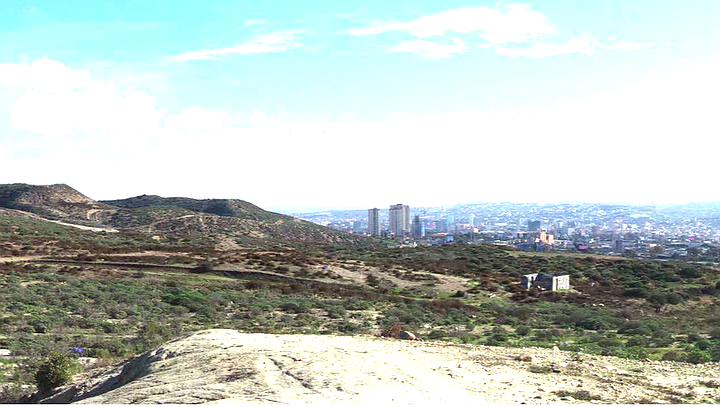
San Ysidro is a majority (93%) Latino community and contains some of the lowest income census tracts in the City of San Diego (SD). Of the 30,000 residents, 70% are Hispanic and 54% have less than a high school education. The median household income is 56% less than that of the City of San Diego and 24% less than the average for California as a whole. San Ysidro is framed by three active freeways: Interstate 5, Interstate 805, and State Route 905. Proximity to the U.S.-Mexico Port of Entry (POE) has raised concerns about air quality due to extreme vehicular wait times and industrial truck exhaust. As many as 120,000 vehicles and 60,000 pedestrians cross the POE each day. While many SD County communities have seen a reduction in air pollutants during the COVID-19 pandemic, San Ysidro has recorded an increase in pollutant levels such as black carbon (BC).
Casa Familiar is the leading non-profit organization in San Ysidro and has a 40+ year history of advocacy, service provision, community planning, and development. Alongside San Diego State University, the San Diego Air Pollution Control District and the University of Washington, Casa Familiar was part of the San Ysidro Community-Based Air Monitoring Study. The goal of this study was to engage the community of San Ysidro in designing, deploying, and analyzing the data collected from a network of low-cost air quality monitors for 12 months. This study found significant links between border wait times at the POE and air pollutant levels at nearby sites.
Currently, 1 in 4 residents in San Ysidro are diagnosed with asthma. Casa Familiar is now advocating for a community park that integrates innovative design and carbon sequestration strategies. Casa Familiar would like to utilize best practices for the urban environmental landscape of Southern California to reduce air pollution and address environmental justice issues. Named Beyer Park in the City of San Diego’s General Design Plan, this 9-acre park sits east of San Ysidro city center. In 2018, local youth successfully advocated for a skate park to be included in the design. The design also includes a ½ basketball court, nondescript trails, and dog park. It is imperative to note that Beyer Park has been in City of San Diego design plans since 1984. It is Casa Familiar’s intention to advocate and provide research-based community-led design ideas to ensure that Beyer Park is environmentally and ecologically sustainable and responsive to community needs and desires. One of the end products from this project is to have an innovative landscape design for the City of San Diego to update in their General Design Plan.
Beyer Park and Collaborations
The collaborations between the City of San Diego, Casa Familiar and residents, University of Southern California Landscape Architecture students, residents of San Ysidro, the Green Infrastructure Consortium, and AGU’s Thriving Earth Exchange program were vital in the successful funding and implementation of this long-awaited project. The figure below displays the collaborations and key stakeholders involved in the advocacy and design of Beyer Park.

Figure 1. Flow map of stakeholders and motivations for the completion of the Beyer Park project in San Ysidro, California.
Through Prop 68 Restoration Grant funding, the City of San Diego outlined the development and design of Beyer Park through a series of community workshops and listening sessions. In 2017-18 San Ysidro Skater Kids organized to ensure that a skate park was included in the design of Beyer Park. In 2019, the City of San Diego agreed to include a skate park into the design.
Connections with the City of San Diego’s Park and Recreation Department and Casa Familiar began in November 2020 to discuss design considerations and priorities, cultural representation as well as grant writing for the construction of the park. In February 2021, scientific experts Hector Covarrubias Del Cueto, Robert Andrade, and Ana Mosqueda joined the team from the University of Southern California’s Master in Landscape Architecture program and Estudio Terrestre.
From here, discussions between scientific experts, Casa Familiar, Thriving Earth Exchange, and the city led to the utilization of the i-Tree software for environmental benefits calculations, a deeper understanding of Kumeyaay culture, and community-represented artwork to be displayed in the park. Figure 3 shows renderings produced by our team of what the proposed park could look like which were presented to community members and the city.
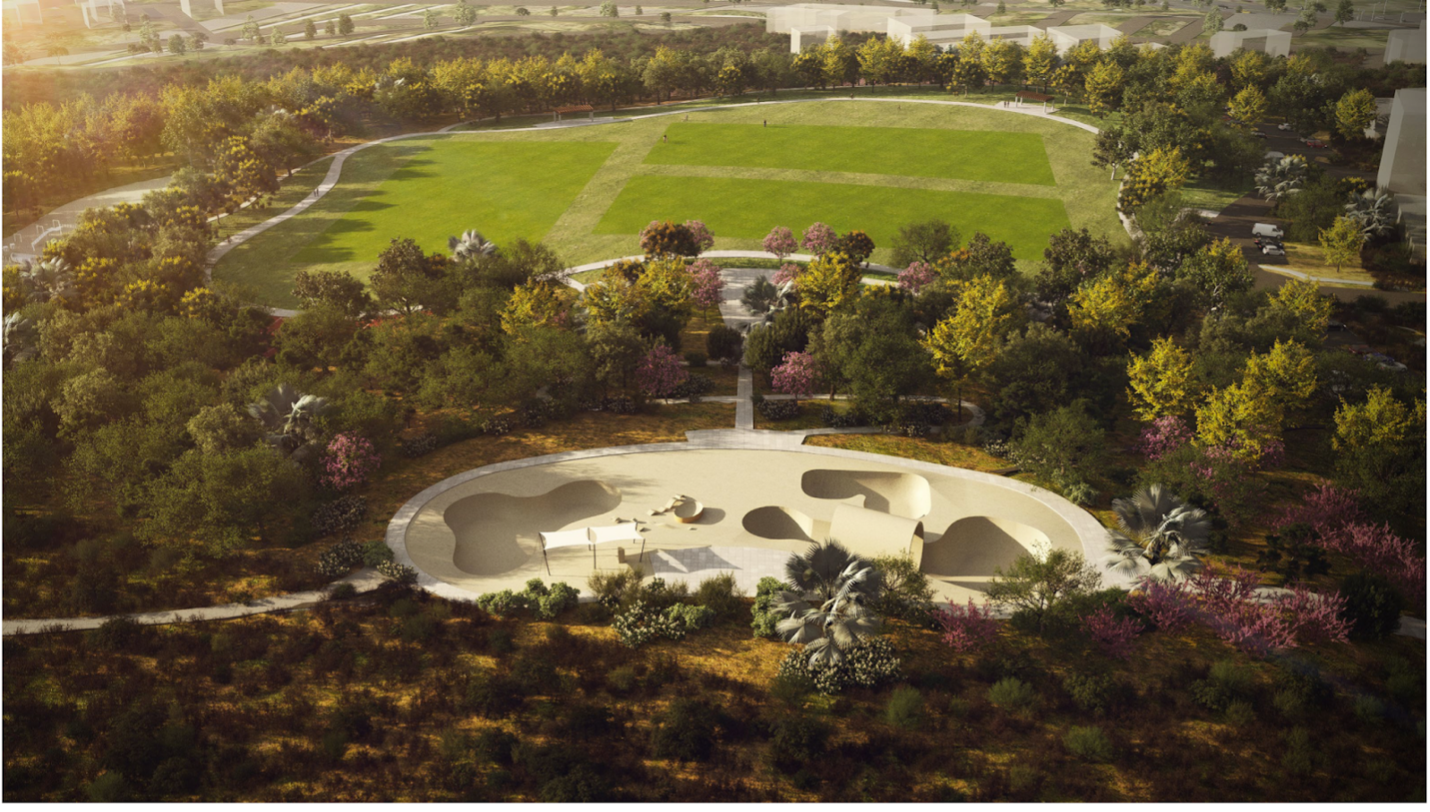
Figure 2. Renderings showcasing the proposed skate park, native vegetation, and sports field for Beyer Park designed by Estudio Terrestre.
Some major outcomes that came from this project include:
Construction of the park was tentative for late 2022/2023. Status of completion can be found at the following links:
Community Efforts in Increasing Access to Green Spaces
In addition to Beyer Park, the team also decided to support three greening workshops to involve residents in the efforts to mitigate air pollution through greening in the San Ysidro community. Each workshop was designed with a specific goal in mind however, one of the largest benefits that came from all 3 workshops was building relationships and trust with San Ysidro residents.
Greening Workshop #1

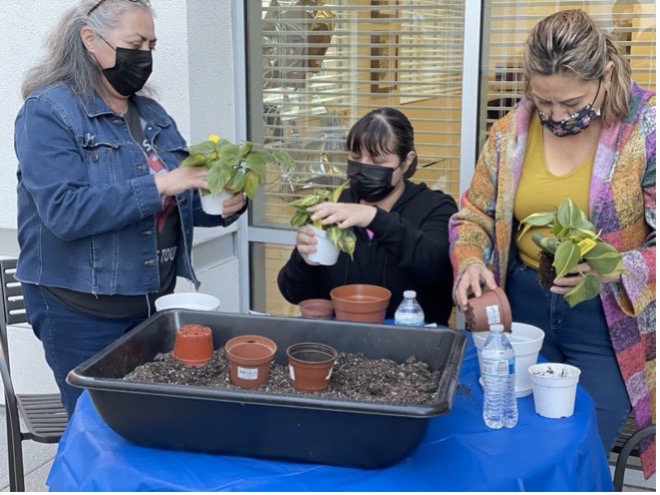
Greening Workshop #2
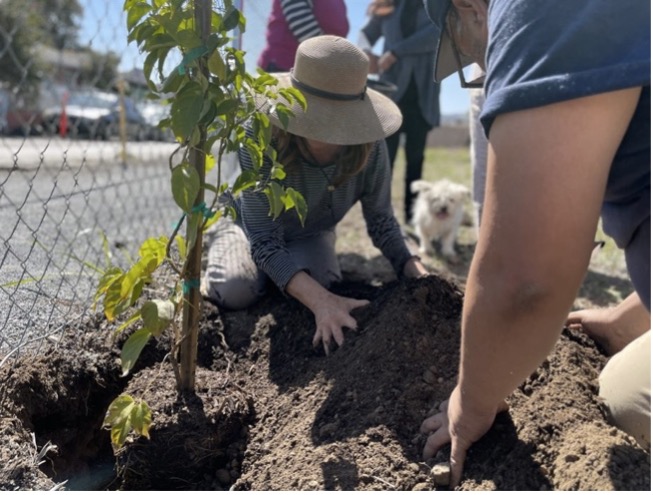
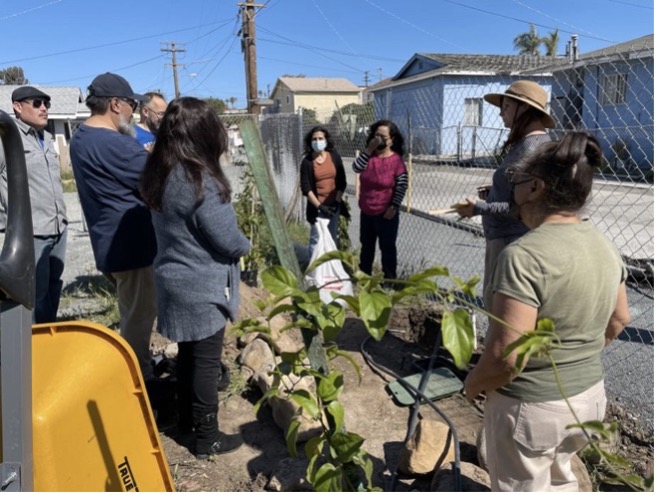
Greening Workshop #3
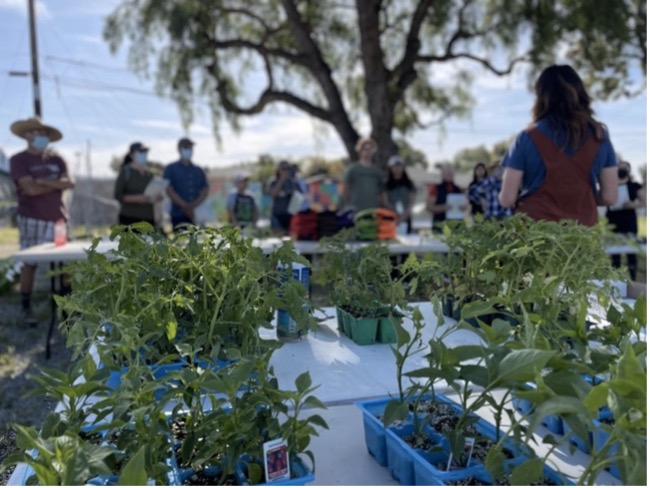
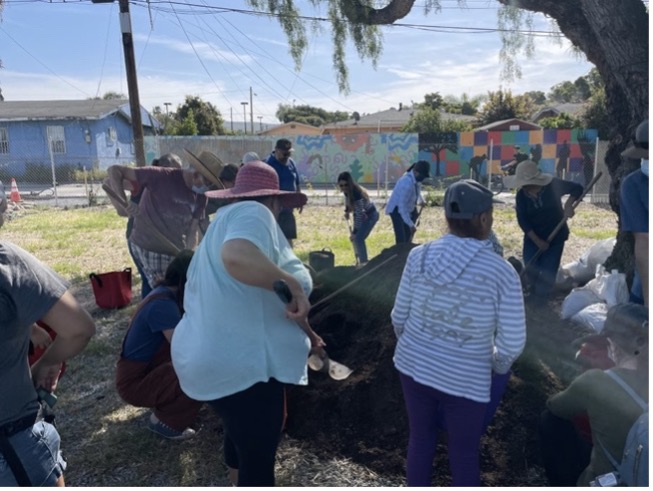
Abrazo 5k Walk – “Let’s Go San Ysidro”
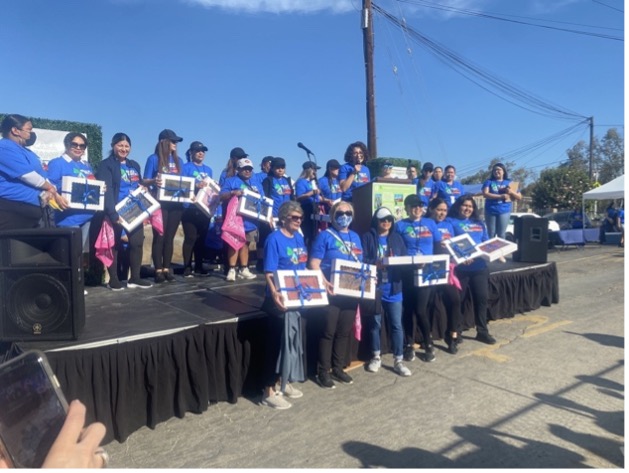
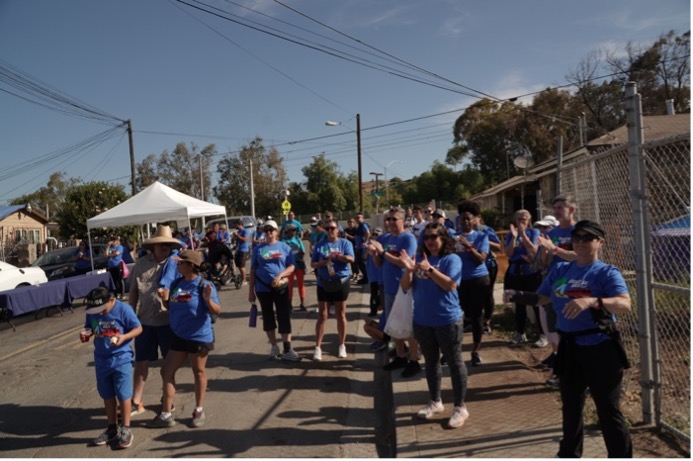
Estenia’s reflections
Alejandro’s Reflections
Casa Familiar’s overall goal is to inform the design of the proposed Beyer Park in the City of San Diego with research-based community-led environmental and ecological solutions that provides social and cultural benefits and mitigates impacts from climate change. This project will require interdisciplinary perspectives and 1-3 scientific partners. This project requires working directly with the Casa Familiar Community Air Quality team, who have mixed backgrounds of community-based research, community development, environmental justice work, and advocacy. Work may include discussions with City of San Diego Parks & Recreation and Sustainability departments.
Project Outputs
Provide environmental solutions for a park in southern California that centers carbon sequestration and social/environmental/ecological benefits to the surrounding community. Project team will focus on research, spatial analysis, and design that focuses on not only on environmental/ecological benefits, but also sociocultural benefits for San Ysidro residents. We will be incorporating community-based feedback on wants/needs for Beyer Park This will result in the creation of proposed landscape design revisions to the City of San Diego for the General Design of Beyer Park. Additionally, we want Beyer Park to serve as a case study for implementing air pollution mitigation strategies.
Project Impact
Together with project partners & collaborators, we will be able to create an environmentally just, equal, and innovative design for the residents of San Ysidro. This will be done through calculation of climate metrics and GHG emission reductions and assessment of environmental, ecological, and public health benefits of proposed design.
Our case study can serve as a tool for Disadvantaged Communities (DAC) throughout California by addressing tangential issues that affect their residents as well. These include transportation justice, green pedestrian corridors, public safety, and serve as a launching pad for future green infrastructure.
Timeline
Identify: Identify appropriate greening solutions for the community of San Ysidro. This stage should take into account native plant species, community preferences, and overall landscape appropriateness (soil, adjacent ecosystems, biodiversity, water use, climate resilience, carbon sequestration and water quality improvement potential)
→ (1-2 months)
Metrics and Design Final Review
Evaluate: Evaluate the efficacy (social, environmental, economic) of greening solutions to mitigate local air pollution in San Ysidro. This can take a modeling approach with existing air quality data from local community air monitors, consider topology and integration of existing plan, impacts to adjacent ecosystems and biodiversity, etc.
→ (3-4 months)
Key Milestone: Submit design to City of San Diego
Fighting pollution by greening the community: AGU’s Thriving Earth Exchange helps the San Ysidro community sequester carbon emissions by enhancing a county park with more trees
The San Ysidro Land Port of Entry is the fourth busiest land port of entry in the world that processes between 70,000 and 90,000 automobiles, as well as about 20,000 pedestrians on foot, each day of the year. A decade-long, $741 million expansion project concluded in 2019 that effectively doubled the car capacity of the border station, but wait times can still be four or more hours at its busiest times. (Trucks cross at the Otay-Mesa Land Port of Entry about nine miles east of San Ysidro.) What happens when 15-20 million cars cross the same border in the same place each year? Orderly as it might be, it’s a daily traffic jam that residents of San Ysidro, California, suspect is an untenable public health crisis.
Read the full story here.
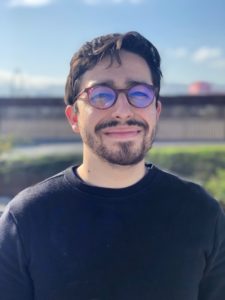 Alejandro Amador is the Community Air Program Supervisor with Casa Familiar. In 2018, Amador joined Casa Familiar as the Community Air Monitoring Technician responsible for aiding in the restoration of the San Ysidro Air Monitoring Network. This community-based research project consists of collaborating with San Diego State University and the University of Washington to place low-cost air monitors around the border community of San Ysidro. This project incorporates engagement with San Ysidro residents and stakeholders to interpret the community’s top air quality concerns as well as educational materials and workshops for the community to grow a better understanding of the impacts of air pollution through the data collected. Now, as the program supervisor, Amador oversees the continuous implementation of Casa Familiar’s air program and grants while working to connect this work to Casa Familiar’s community development and advocacy efforts.
Alejandro Amador is the Community Air Program Supervisor with Casa Familiar. In 2018, Amador joined Casa Familiar as the Community Air Monitoring Technician responsible for aiding in the restoration of the San Ysidro Air Monitoring Network. This community-based research project consists of collaborating with San Diego State University and the University of Washington to place low-cost air monitors around the border community of San Ysidro. This project incorporates engagement with San Ysidro residents and stakeholders to interpret the community’s top air quality concerns as well as educational materials and workshops for the community to grow a better understanding of the impacts of air pollution through the data collected. Now, as the program supervisor, Amador oversees the continuous implementation of Casa Familiar’s air program and grants while working to connect this work to Casa Familiar’s community development and advocacy efforts.
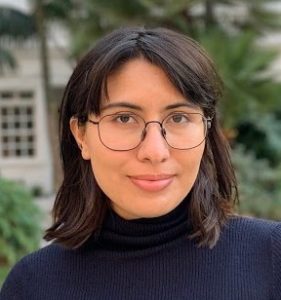 Sarina Vega is an Air Quality Technician at Casa Familiar. Her background is in environmental science and policy. At Casa Familiar, her roles as a researcher and public health advocate intersects with issues of public health, environmental justice, transportation, data analysis and community outreach/engagement is a large part of her position. She has extensive experience working in San Ysidro schools, with promotoras and youth. She is deeply interested in GIS work and has spent time studying the U.S./Mexico border landscape and urban infrastructures. Before Casa Familiar, she also worked at Green-Wood Cemetery in Brooklyn, NY and U.S. Fish & Wildlife Youth Conservation Corps. She is currently pursuing a certificate in Geographic Information Systems (GIS) at UCSD.
Sarina Vega is an Air Quality Technician at Casa Familiar. Her background is in environmental science and policy. At Casa Familiar, her roles as a researcher and public health advocate intersects with issues of public health, environmental justice, transportation, data analysis and community outreach/engagement is a large part of her position. She has extensive experience working in San Ysidro schools, with promotoras and youth. She is deeply interested in GIS work and has spent time studying the U.S./Mexico border landscape and urban infrastructures. Before Casa Familiar, she also worked at Green-Wood Cemetery in Brooklyn, NY and U.S. Fish & Wildlife Youth Conservation Corps. She is currently pursuing a certificate in Geographic Information Systems (GIS) at UCSD.
Lisa Cuestas is currently Chief Executive Officer of Casa Familiar, a 501(c)(3) non-profit community-based organization in San Ysidro, CA. Ms. Cuestas has worked for Casa Familiar for 20 years and nearly 25 years of experience in the non-profit sector. Ms. Cuestas’ passion is the development of workforce programs for youth and has supervised many service programs and contracts while at Casa Familiar.
Hector Covarrubia Del Cueto has a background in architecture and is from Guadalajara, Mexico. He has worked with private initiatives, government instances, nonprofits, and indigenous communities. The projects he has worked on range from mixed use developments and urbanization projects, to regional gardens, productive community gardens, and sustainable indigenous home schemes. He is currently completing his Masters in Landscape Architecture + Urbanism at USC and is a part of the Landscape Justice Initiative.
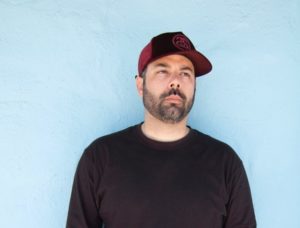 Robert Andrade is originally from San Diego and holds a Masters of Fine Arts from Cornell University and a Bachelors degree from The School of the Art Institute of Chicago. He has been a practicing artist and educator for the past 10 years. More recently, Andrade is completing his Masters in Landscape Architecture + Urbanism at USC with the hope to work in areas regarding climate resiliency along with equity and inclusion. Robert likes making music for fun and reading.
Robert Andrade is originally from San Diego and holds a Masters of Fine Arts from Cornell University and a Bachelors degree from The School of the Art Institute of Chicago. He has been a practicing artist and educator for the past 10 years. More recently, Andrade is completing his Masters in Landscape Architecture + Urbanism at USC with the hope to work in areas regarding climate resiliency along with equity and inclusion. Robert likes making music for fun and reading.
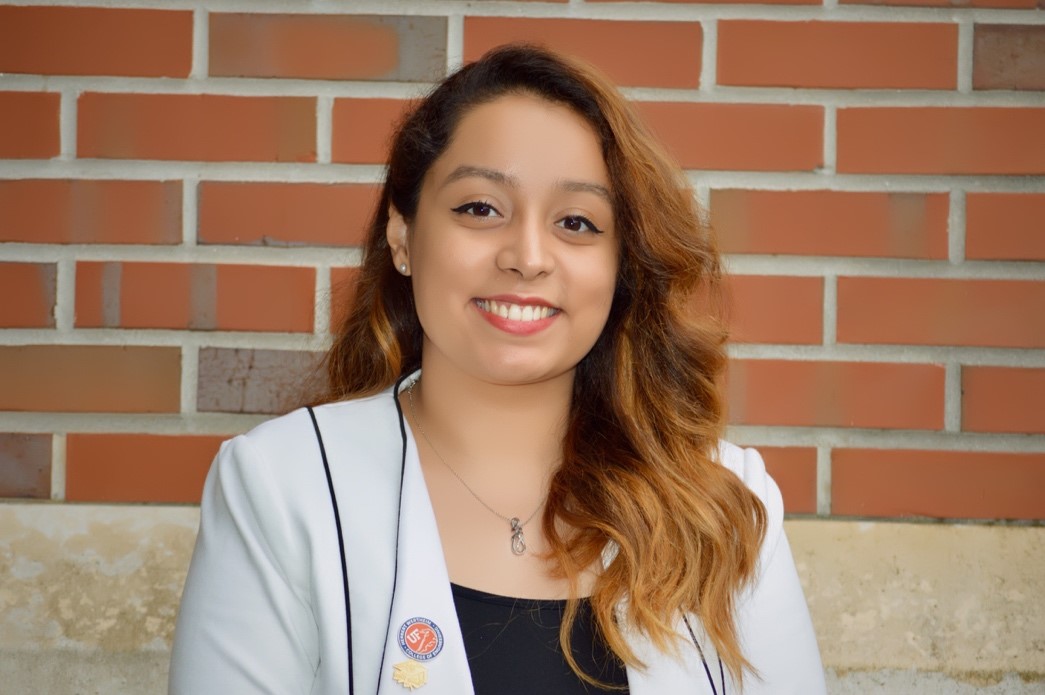 Estenia Ortiz Carabantes is a community science fellow in the Science, Policy, and Engagement Cohort (SPEC) with Thriving Earth Exchange. She is a PhD student in Environmental Engineering at the University of South Florida (USF) and received her Master of Science in Environmental Engineering from USF as well. She received her bachelor’s in environmental engineering sciences at the University of Florida (UF). Her research interests include water quality, water reuse, food security, and sustainable development through community-engaged research. Some of her previous projects include analyzing modified powdered activated carbon impacts on mercury removal from water, assessing heavy metal content in edible seaweed, and conducting a holistic, systems thinking framework to the food-energy-water nexus in seaweed farming in Belize.
Estenia Ortiz Carabantes is a community science fellow in the Science, Policy, and Engagement Cohort (SPEC) with Thriving Earth Exchange. She is a PhD student in Environmental Engineering at the University of South Florida (USF) and received her Master of Science in Environmental Engineering from USF as well. She received her bachelor’s in environmental engineering sciences at the University of Florida (UF). Her research interests include water quality, water reuse, food security, and sustainable development through community-engaged research. Some of her previous projects include analyzing modified powdered activated carbon impacts on mercury removal from water, assessing heavy metal content in edible seaweed, and conducting a holistic, systems thinking framework to the food-energy-water nexus in seaweed farming in Belize.
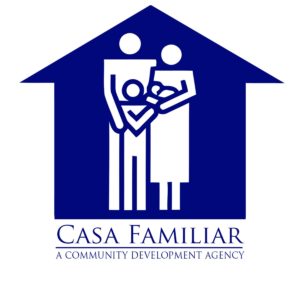 Casa Familiar was founded in 1973 and is a 501(c)(3), community-based organization dedicated to serving residents in South San Diego County. Originally established in 1968 under the name Trabajadores de la Raza, Casa has grown and expanded its efforts from solely serving Spanish-speaking clients in San Ysidro to providing services and programs to all South San Diego County residents. Early on, Casa recognized that its predominantly low-income clients have changing and varied needs. Casa‘s approach allows the agency to adapt to community needs through a multi-faceted program and funding strategy. This permits the sustaining of advocacy and community development at its core, while simultaneously examining and addressing community needs. Casa Familiar has been serving people in South San Diego for 48 years.
Casa Familiar was founded in 1973 and is a 501(c)(3), community-based organization dedicated to serving residents in South San Diego County. Originally established in 1968 under the name Trabajadores de la Raza, Casa has grown and expanded its efforts from solely serving Spanish-speaking clients in San Ysidro to providing services and programs to all South San Diego County residents. Early on, Casa recognized that its predominantly low-income clients have changing and varied needs. Casa‘s approach allows the agency to adapt to community needs through a multi-faceted program and funding strategy. This permits the sustaining of advocacy and community development at its core, while simultaneously examining and addressing community needs. Casa Familiar has been serving people in South San Diego for 48 years.
This project is supported by funding from the Gordon and Betty Moore Foundation.
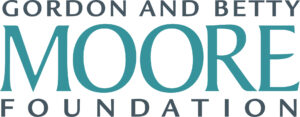
(c) 2024 Thriving Earth Exchange